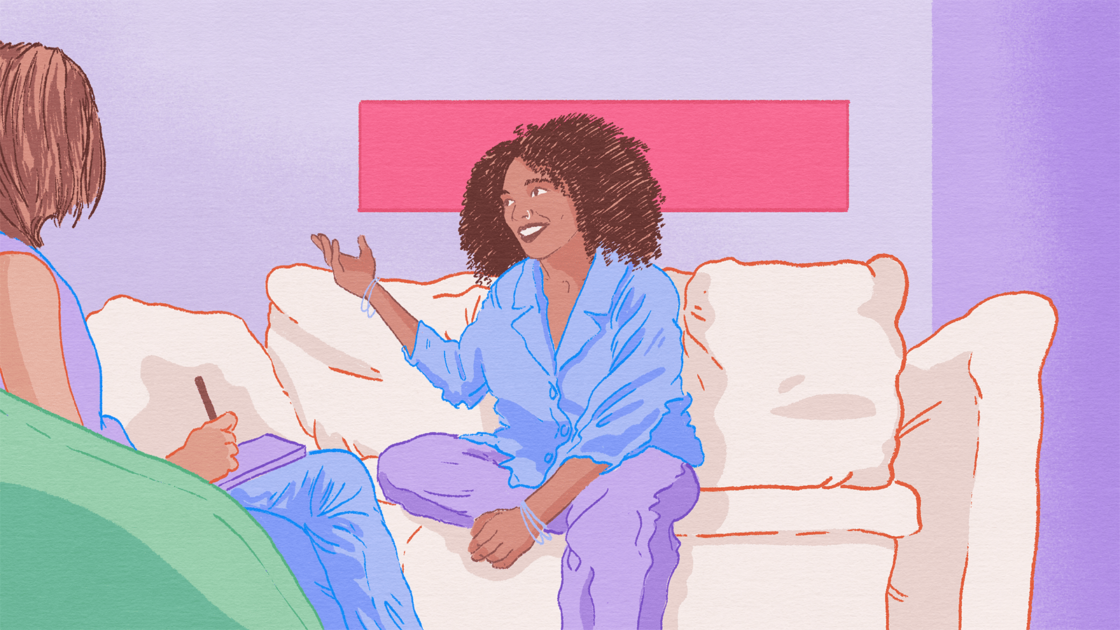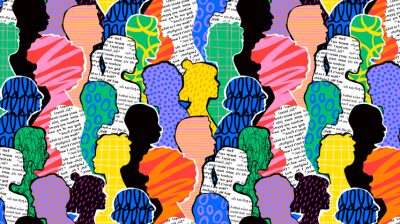What to do if you tried therapy for your mental health and it wasn’t helpful
Therapy has been hugely helpful for many people, but if you tried therapy and it didn’t work for you, that doesn’t have to be the end of your recovery journey.

Therapy, sometimes called psychotherapy or counselling, is the process of meeting with a therapist to help build a deeper understanding of your mental health issues and find ways of responding to them to help you recover and thrive. Making the decision to go to therapy to get support for a mental health issue can be a really big step. Some people carry the weight and distress of their mental health issues on their own for a long time before making the decision to see a therapist. Sometimes, people have to spend some time on a waiting list before they are able to start their therapy journey. The process of opening up to a new therapist who you don’t know about personal and sometimes painful things can be exhausting at first.
It takes courage to go to therapy. So, if you start going to therapy and it’s not what you expected and you don’t think it’s helping, that can leave you feeling disheartened, confused, frustrated and even hopeless. If you’re worried that therapy isn’t working for you, or if you have given up on therapy because it wasn’t helpful for you in the past, you’re not alone and that doesn’t have to be the end of your mental health recovery journey.
How to know if therapy isn’t working for you
The way therapy works is complicated, so it can be tricky to know if a therapy isn’t working for you. If you take a painkiller, you know it’s working when it eases your pain. Therapy, on the other hand, takes a longer period of time to work and the signs of success can be subtle and can vary from person to person. Mental health recovery isn’t linear, so people often don’t feel better after every therapy session, and, in a minority of cases, things can feel worse before they feel better. Engaging in therapy can be uncomfortable and tiring in the beginning, especially if you aren’t used to opening up about your thoughts and feelings. Sometimes people can misinterpret this initial discomfort as a sign that therapy isn’t for them. That’s why it’s usually a good idea to stick with a new therapy for a few sessions before making a decision about whether or not you want to continue.
Here are some signs that a therapy may not be working for you:
- You don’t feel like your therapist is listening to you or understanding you
- You aren’t gaining any new insights into your mental health symptoms or what’s causing them
- You aren’t noticing any progress or reduction in your symptoms after 6 or more sessions
- You leave every session feeling disappointed
- You are feeling judged by your therapist
- You aren’t picking up techniques that you can apply in your daily life to help cope
Why is therapy not working for me?
There are many reasons why therapy might not be helping you on your recovery journey. Understanding what factors are playing a role in making therapy unhelpful is an important step to help you move forward and figure out what needs to change so that you can get the right type of support that meets your needs. If therapy isn’t working for you, here are some things that could be happening.
Your current therapy needs some adjustments
No matter what therapeutic approach a therapist uses, therapy should always be tailored to suit the individual and fit their circumstances. Sometimes when someone isn’t finding therapy effective, this can be resolved by the therapist working with them to make adjustments to their current therapeutic plan. This could include practical changes like clients changing the day, time, or frequency of their therapy visits, shifting the focus of therapy sessions to the issues that are most important to you, or setting different goals or outcomes that you can work towards together. You can raise these possibilities yourself at any time and don’t have to wait for the therapist to bring them up.
Your therapist-client relationship doesn’t fit
Having a high-quality therapist-client relationship is one of the best signs that your therapy will be helpful. When you have a good relationship with your therapist, they will understand your thoughts and feelings, they will accept your values, they will listen to you and take your input onboard and they should make you feel safe, comfortable and accepted. If these things are missing with your current therapist, this could be why therapy isn’t working for you. Almost all therapists recognise the importance of the relationship and that, without it being anybody’s fault, sometimes the ‘fit’ just isn’t right. So don’t be afraid to mention this.
You need a different type of therapy
If you go to see a counsellor or psychotherapist for your mental health, they will approach the issues you’re facing in a particular way based on the therapeutic approach that they are trained in. Lots of people think that all therapists receive the same training, but there are actually a lot of different types of therapy out there and different therapists are trained in delivering different therapy types. Each type of therapy has its own way of understanding mental health issues and its own collection of tools and strategies for supporting mental health recovery. If the type of therapy your therapist uses isn’t a good fit for you, this could be why you aren’t finding therapy helpful. Mention this and discuss it with the therapist who may be able to use a different approach that will work well for you. Alternatively, the therapist may be able to suggest someone else whose approach might work better for you.
You need a combination of treatments
Many people will require a combination of mental health treatments to support their recovery, especially those who have more complex mental health issues. A common treatment combination is therapy and mental health medication. Sometimes, mental health symptoms like very low mood, lack of motivation, or severe anxiety and panic can make it really difficult to engage in therapy and put the techniques you learn in therapy into practice. Mental health medications can ease these symptoms so you can get the most out of therapy.
You need more intensive support
If therapy isn’t working for you, your care needs may be too complex and you may need more intensive support from Child or Adult Mental Health Services or inpatient care. If this is the case, your therapist or GP should raise this with you and discuss your options for getting a referral to one of these services. If they don’t raise it with you, then you could raise it yourself.
What to do next if mental health therapy isn’t working for you
It takes time, energy, and courage to take the first step and access therapy. Meeting a new person and telling your story can be draining, so when you don’t feel like you’re benefiting from therapy, it can be really disappointing and trying again can be difficult.
Mental illness is just like any other health condition, the first treatment doesn’t always work. The good news is, having a negative experience with therapy doesn’t mean that your mental health issues can’t be treated. If you feel like therapy isn’t working for you, it’s important to take action, make changes, and keep moving forwards on your recovery journey. Here are some steps you might find helpful.
Discuss your concerns with your therapist
If therapy isn’t working, start by talking to your therapist about your concerns. They may change their approach to treatment, help you change your treatment goals or outcomes, give you different coping tools and techniques, or help you find alternative support.
You don’t need to worry about offending your therapist by telling them it’s not working for you. Therapists are expected to act in the best interests of their clients and sometimes that includes supporting them by changing their approach, supporting them in finding a different therapist who can better meet their needs, or recommending they access a different form of mental health treatment. Discussing your experiences of the therapy with your therapist can help you find out why you aren’t finding it helpful and come up with a plan of what to do next.
Here are some questions you can ask:
• How long should it take for me to see results from therapy?
• Could we try a different type of therapy?
• Is there anything I can do to get more out of this therapy?
• Could medication or other supporting treatments help?
Try a new therapist
If you feel like your current therapist isn’t a good fit for you, trying a new therapist could be a good next step. If you’re accessing a therapist through the HSE, it won’t always be possible to try out many different therapists. But finding a therapist who you feel comfortable opening up to and who makes you feel listened to and supported could be the key to success in your treatment journey.
If you are searching for a therapist, pay attention to the types of conditions they work with and the types of therapy they are trained in. Read about the different types of therapy beforehand and see if there is a particular approach that you think would work well for you.
Try different treatment options
Talk therapies are only one form of mental health treatment, and they aren’t effective for everyone. Some people find that they need an alternative to talk therapy to help support them on their recovery journey. Approaches like group therapy or art and creative therapies might be a better fit for your needs. Many people also find social prescribing helpful, which involves getting referred by your GP to an activity in your community like cookery, meditation, GAA, men’s sheds, music, drama, walking groups and many more. All of these things can have a significant positive impact on your mental health.
Talk to Your GP
Whether you want to talk about concerns about your current therapy, finding a new therapist or therapeutic approach, or accessing supportive or alternative treatments like medication or inpatient care, your GP can help. GPs are the main referral partners for mental health support in Ireland. This means that in addition to being able to give you direct support by prescribing medication, your GP can put you in touch with a wide range of mental health support services. They can also give you advice on what treatment or combination of treatments will best suit your needs. Being honest with your GP about the issues you had with therapy so far and what you would like to get from mental health treatment will help them make informed decisions about what treatments will work best for you.
Feeling overwhelmed and want to talk to someone?
- Get anonymous support 24/7 with our text message support service
- Connect with a trained volunteer who will listen to you, and help you to move forward feeling better
- Whatsapp us now or free-text SPUNOUT to 50808 to begin.
- Find out more about our text message support service
If you are a customer of the 48 or An Post network or cannot get through using the ‘50808’ short code please text HELLO to 086 1800 280 (standard message rates may apply). Some smaller networks do not support short codes like ‘50808’.






